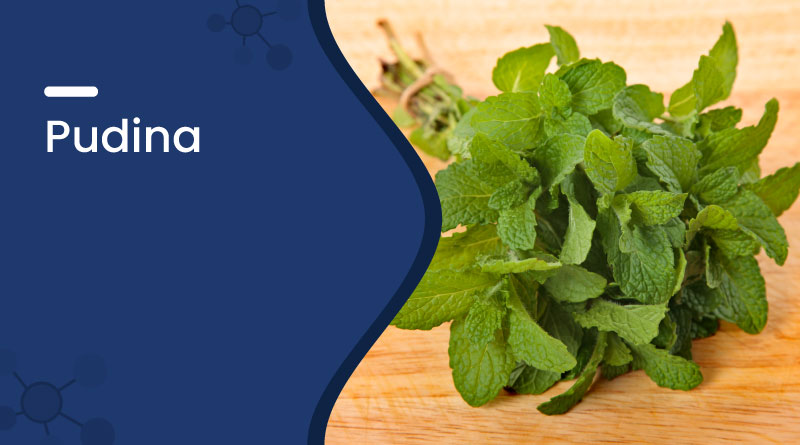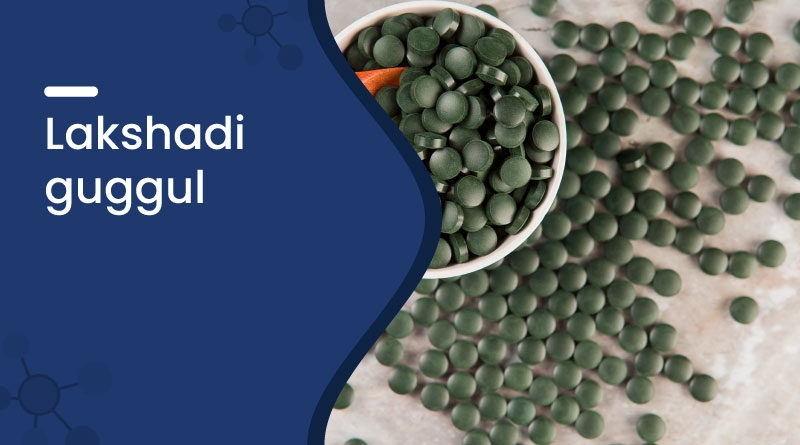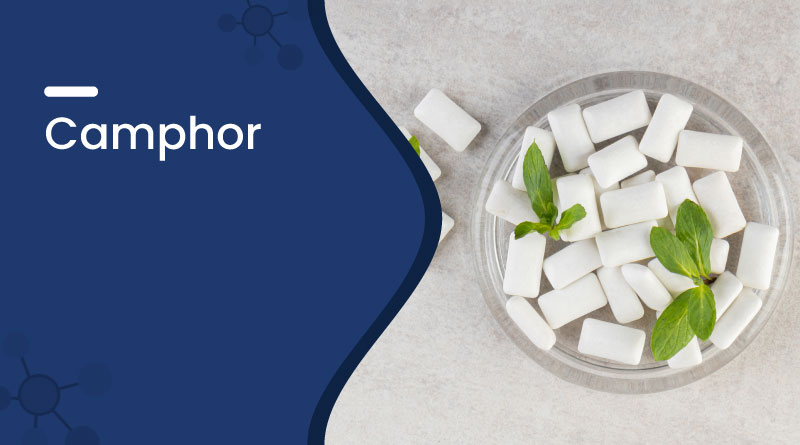Pudina (Mint): Health Benefits, Uses & Ayurvedic Importance


Pudina, commonly known as Mint, is a refreshing and aromatic herb widely used in Ayurveda, home remedies, and culinary practices for its cooling and digestive properties. Known for its strong fragrance and soothing effect, Pudina plays a vital role in treating digestive disorders, respiratory issues, and skin problems. Its leaves contain powerful essential oils and bioactive compounds that work to refresh the body, stimulate the senses, and ease discomfort. Pudina balances the Pitta and Kapha doshas and is especially beneficial during hot seasons due to its natural cooling energy. Whether taken fresh, dried, or as an oil, Pudina is a simple yet powerful herb that supports overall wellness.
Key Components of Pudina (Mint):
Pudina contains several natural compounds that are responsible for its healing effects:
- Menthol: This is the primary active ingredient that gives Pudina its cooling and refreshing properties. It helps relax muscles, clears nasal congestion, and improves digestion.
- Antioxidants (Rosmarinic acid, flavonoids): These compounds help fight free radicals, reduce inflammation, and protect the body from oxidative stress.
- Essential Oils: Pudina oil contains antimicrobial and anti-inflammatory elements that benefit skin, respiratory health, and digestion.
- Vitamins & Minerals: Pudina leaves have Vitamins A, C, iron, and calcium, boosting overall health.
Together, these elements make Pudina a highly effective herb for daily use in both dietary and therapeutic applications.
Importance of Pudina in Ayurveda:
Pudina's cooling and light properties are valued in Ayurveda. It is often used to balance aggravated Pitta, calm inflammation, reduce heat in the body, and improve Agni (digestive fire). Pudina is also important for treating symptoms of indigestion, bloating, headaches, and nasal blockages. In Ayurvedic formulations, Pudina is used as an Anupan (carrier) to enhance digestion and improve the delivery of other herbs. Its versatility and easy availability make it a go-to remedy in countless Ayurvedic and household applications.
Benefits of Pudina:
- Pudina for Indigestion: Pudina is one of the best natural herbs for indigestion, bloating, and gas. Its carminative properties help soothe the stomach muscles, relieve gas buildup, and promote better bile flow. Whether consumed as tea or chutney, Pudina stimulates the appetite and eases discomfort after heavy meals.
- Pudina for Acidity and Nausea: Its cooling and anti-inflammatory nature help manage acidity and heartburn. Pudina calms the stomach lining, neutralizes excess acid, and relieves nausea or vomiting, especially in cases of motion sickness or pregnancy-related morning sickness.
- Pudina for Respiratory Disease: The menthol in Pudina clears nasal congestion, eases throat irritation, and opens the airways. It acts as a natural decongestant, making it effective in conditions like asthma, bronchitis, and the common cold. Inhaling Pudina steam or using Pudina oil helps improve breathing.
- Pudina for Skin Problems: Pudina's cooling and antibacterial traits make it great for acne, rashes, itching, and sunburn. It cleanses skin, reduces swelling, and gives a natural glow. Pudina paste or water is often used in face masks or baths for clear and refreshed skin.
- Pudina for Stress and Headache: Pudina's smell calms the nervous system. It relieves stress, fatigue, and mental tension. Applying Pudina oil on the temples or inhaling its vapor helps ease headaches, especially those caused by heat or congestion.
- Pudina for Bad Breathing: Pudina fights bad breath and oral bacteria, making it a natural remedy for maintaining fresh breath and gum health. It is commonly used in Ayurvedic tooth powders and herbal mouthwashes.
- Pudina for Obesity: Pudina helps with weight loss by boosting digestion and metabolism. Its ability to detoxify the body and reduce bloating makes it a gentle and supportive herb for those trying to manage weight naturally.
- Pudina for Fever: Pudina tea or juice is often given during fever to reduce body temperature and soothe the system. Its cooling nature helps flush out toxins and support hydration during high body heat or summer exhaustion.
- Pudina for Menstrual Cramps: Pudina's calming traits relax uterine muscles, easing menstrual cramps. Drinking Pudina tea during periods can ease pain and improve mood.
- Pudina for Liver Dysfunction: Pudina helps in flushing out toxins from the liver and supports its overall function. It promotes bile secretion, which improves digestion and detoxification.
How to Use Pudina?
| Form | Usage |
|---|---|
| Fresh leaves | Used in teas, chutneys, juices |
| Dried powder | Used as a spice or supplement |
| Essential oil | Used in aromatherapy or diluted for skin use |
| Juice | Used for detox and cooling drinks |
Common Methods:
- Pudina Tea: Boil a few fresh leaves in water and sip for digestive or respiratory benefits.
- Chutney: Blend with coriander, lemon, and salt to make a refreshing side dish.
- Juice: Mix Pudina leaves with lemon and honey to create a cooling summer drink.
- Paste: Apply on the skin to relieve pimples, itching, or sunburn.
- Oil: Use for steam inhalation, massage, or in aromatherapy for stress and headaches.
When to Use Pudina?
- After Meals: For digestion and gas relief
- During Fever or Summer: As a coolant
- Morning or Evening: As tea for respiratory health or stress relief
- During Periods: To ease cramps
- Topically: For skin rashes or acne, apply as needed
How Does Pudina Work?
Pudina works by stimulating the digestive enzymes and bile flow, which helps break down food and prevents indigestion. Its essential oils, especially menthol, relax the muscles of the digestive and respiratory tracts, reduce inflammation, and promote a sense of freshness. When applied to the skin, it soothes irritation and clears pores. Pudina’s natural antibacterial and antioxidant effects cleanse the body internally and externally.
Who Should Use Pudina?
- People with indigestion, bloating, or acidity
- Individuals with cough, cold, or respiratory congestion
- Those with acne or sensitive skin
- Anyone looking for natural stress relief or a headache remedy
- People wanting to improve oral hygiene or breath freshness
- Women with menstrual cramps
Safety Measures:
- Avoid in large amounts during pregnancy unless advised.
- People with severe GERD or acid reflux should use it with caution.
- Essential oils should not be applied directly to the skin without dilution.
- Not recommended for infants or very small children.
- Consult a doctor if on blood pressure or diabetes medications.
Conclusion:
Pudina is a timeless Ayurvedic herb that cools, calms, and cleanses the body in multiple ways. From easing digestion and relieving headaches to improving skin and breathing, this humble kitchen herb offers a wide range of health benefits. Safe, versatile, and easy to include in your daily routine, Pudina supports overall wellness and balance. Whether you enjoy it as tea, chutney, or oil, it’s a natural and effective way to feel refreshed from the inside out.
Frequently Asked Questions (FAQs):
Q: Can Pudina be consumed daily?
A. Yes, Pudina can be safely used in small amounts daily through tea, chutney, or fresh leaves.
Q: Is Pudina good for digestion?
A. Absolutely. It soothes the stomach, reduces gas, and stimulates digestive enzymes.
Q: Can Pudina help with skin problems?
A. Yes, Pudina has antibacterial and cooling effects that help clear acne and soothe skin irritation.
Q: Is Pudina safe during pregnancy?
A. In small food amounts, yes. However, large quantities of essential oils should be avoided unless approved by a doctor.
Q: How does Pudina help with colds?
A. Menthol in Pudina helps clear nasal passages, ease breathing, and reduce throat irritation.








 Added!
Added!